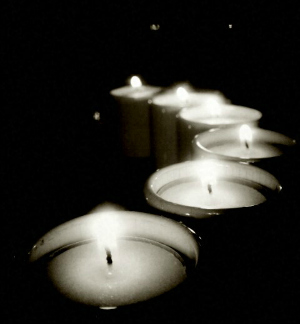One of the areas in which I really want to improve myself for the coming year is my relationship to tzedakah, or charitable giving. It’s an oft-repeated sentiment that charity is not really the right word to describe tzedakah in English because charity carries with it the implication that your heart compels you to go beyond the call of duty in terms of helping others. I’m not saying that charity can’t be present in tzedakah, but giving in Judaism is not an option, it’s an expression of righteousness, an obligation to do the right thing and help to rebuild the world and lift others out of poverty and hunger. Tzedakah can also begin at home – if you have family who is struggling to keep food on the table, then your obligation is to help them have enough to eat first, before you turn your attention to the neighborhood, local, state, or national level. I like that, because it makes me think of ripples extending outwards. We set to right problems at home before moving on, but once things at home are sorted out, it’s often easier to move on to the next level up. It’s the same kind of concept with repairing relationships before Yom Kippur, during the Ten Days of Awe – once you’re right with yourself, you can begin to repair your interpersonal relationships, and then that spills over into your relationships with people in the wider world. Positive energy moving in concentric circles.
I love that Judaism stresses the concept that the most valuable part of tzedakah is to lift someone out of poverty, making them self-sufficient and able to provide not only for themselves and their family, but perhaps others in their community. I’ve seen the powerful effect of microloans in India, and it’s why one of the organizations I will be donating my tzedakah money to is Kiva.org. Another cause that’s dear to my heart is donorschoose.org (though I got angry and near tears the last time I browsed for projects), because if we provide our students with the resources they need to learn effectively, that is their best chance of breaking out of poverty. I need to find a Jewish organization that speaks to me as well, but I think I might be leaning towards something dealing with food security.
When we fast on Yom Kippur, we are asked to give the money we would have spent on food to a food pantry or to donate an equivalent amount of food. In Orthodox communities, it is often customary to donate the chicken used for kapparot to the poor so that they may have something delicious to eat, a luxury they cannot otherwise afford. As we prepare for the fast, we will go hungry for 25 hours, but the promise of food awaits at the end. For too many others in America (not to mention the world), that is not the case. Hunger becomes an interminable part of life, something from which there is no escape. I’m so glad that the school where I’m presently working at has begun to offer not only universal free breakfasts, but lunches as well. When students are hungry, they cannot learn. When they cannot learn, their chances of escaping poverty diminish further. There are so many different ways in which we can give: of our time, of our money, of our energy, that can help us to repair the world, to lift others out of poverty, to do what is righteous. It’s something I have been less than stellar at in the past, but I am determined to improve this part of myself in the coming year.
